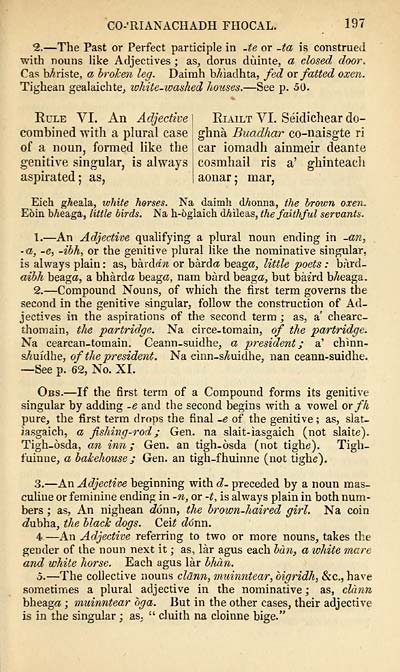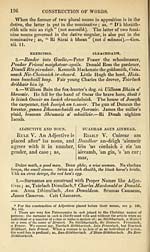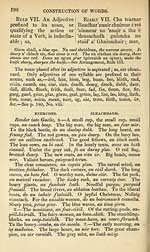Books and other items printed in Gaelic from 1841 to 1870 > Stéidhean a' Ghràmair Ghaëlig
(225) Page 197
Download files
Complete book:
Individual page:
Thumbnail gallery: Grid view | List view

CO-'RIANACHADH FHOCAL.
197
2. — The Past or Perfect participle in -te or -ta is construed
with nouns like Adjectives ; as, dorus dùinte, a closed door.
Cas bAriste, a brohen leg. Daimh b/iìadhta, fed or fatted oxen.
Tighean gealaichte, white-washed houses. — See p. 50.
Rule VI. An Adjective
combined with a plural case
of a noun, formed like the
genitive singular, is always
aspirated; as,
Riailt VI. Sèidichear do-
ghnà Buadhar co-naisgte ri
car iomadh ainmeir deante
cosmhail ris a' ghinteach
aonar 5 mar,
Eich g&eala, white horses. Na daimh dAonna, the hrown oxen.
Eòin bAeaga, little birds. Na h-òglaich dAìleas, thefaithful servants.
1. — An Adjective qualifying a plural noun ending in -an,
-a, -e, -ibh, or the genitive plural like the nominative singular,
is always plain : as, bkràdn or bàrda beag«, little poets : bàrd-
aibh beaga, a bhàrda beaga, nam bàrd beaga, but bàerd bAeaga.
2. — Compound Nouns, of which the first term governs the
second in the genitive singuìar, follow the construction of Ad-
jectives in the aspirations of the second term ; as, a' chearc-
thomain, the partridge. Na circe-tomain, of the partridge.
Na cearcan-tomain. Ceann-suidhe, a president ; a' chìnn-
sAuidhe, ofthe president. Na eìnn-sAuidhe, nan ceann-suidhe.
— See p. 62, No. XI.
Obs. — If the first term of a Compound forms its genitive
singular by adding -e and the second begins with a vowel or fh
pure, the fìrst term drops the final -e of the genitive ; as, slat-
ìasgaich, a fishing-rod ; Gen. na slait-ìasgaich (not slaite).
Tigh-òsda, an inn ; Gen. an tigh-òsda (not tighe). Tigh-
fuinne, a bahehouse ; Gen. an tigh-fhuinne (not tighe).
3. — An Adjective beginning with d- preceded by a noun mas-
culine or feminine ending in -n, or -t, is always plain in both num-
bers ; as, An nighean c?ònn, the brown-haired girl. Na coin
<?ubha, ilie black dogs. Qe.it doxm.
4 — An Adjective referring to two or more nouns, takes the
gender of the noun next it ; as, làr agus each bàn, a white mare
and white liorse. Each agus làr bhàn.
5. — The collective nouns clann, muinntear, òigridh, &c, have
sometimes a plural adjective in the nominative ; as, clànn
bheag^ ; muinntear oga. But in the other cases, their adjective
is in the singular ; as. " cluith na cloinne bige."
197
2. — The Past or Perfect participle in -te or -ta is construed
with nouns like Adjectives ; as, dorus dùinte, a closed door.
Cas bAriste, a brohen leg. Daimh b/iìadhta, fed or fatted oxen.
Tighean gealaichte, white-washed houses. — See p. 50.
Rule VI. An Adjective
combined with a plural case
of a noun, formed like the
genitive singular, is always
aspirated; as,
Riailt VI. Sèidichear do-
ghnà Buadhar co-naisgte ri
car iomadh ainmeir deante
cosmhail ris a' ghinteach
aonar 5 mar,
Eich g&eala, white horses. Na daimh dAonna, the hrown oxen.
Eòin bAeaga, little birds. Na h-òglaich dAìleas, thefaithful servants.
1. — An Adjective qualifying a plural noun ending in -an,
-a, -e, -ibh, or the genitive plural like the nominative singular,
is always plain : as, bkràdn or bàrda beag«, little poets : bàrd-
aibh beaga, a bhàrda beaga, nam bàrd beaga, but bàerd bAeaga.
2. — Compound Nouns, of which the first term governs the
second in the genitive singuìar, follow the construction of Ad-
jectives in the aspirations of the second term ; as, a' chearc-
thomain, the partridge. Na circe-tomain, of the partridge.
Na cearcan-tomain. Ceann-suidhe, a president ; a' chìnn-
sAuidhe, ofthe president. Na eìnn-sAuidhe, nan ceann-suidhe.
— See p. 62, No. XI.
Obs. — If the first term of a Compound forms its genitive
singular by adding -e and the second begins with a vowel or fh
pure, the fìrst term drops the final -e of the genitive ; as, slat-
ìasgaich, a fishing-rod ; Gen. na slait-ìasgaich (not slaite).
Tigh-òsda, an inn ; Gen. an tigh-òsda (not tighe). Tigh-
fuinne, a bahehouse ; Gen. an tigh-fhuinne (not tighe).
3. — An Adjective beginning with d- preceded by a noun mas-
culine or feminine ending in -n, or -t, is always plain in both num-
bers ; as, An nighean c?ònn, the brown-haired girl. Na coin
<?ubha, ilie black dogs. Qe.it doxm.
4 — An Adjective referring to two or more nouns, takes the
gender of the noun next it ; as, làr agus each bàn, a white mare
and white liorse. Each agus làr bhàn.
5. — The collective nouns clann, muinntear, òigridh, &c, have
sometimes a plural adjective in the nominative ; as, clànn
bheag^ ; muinntear oga. But in the other cases, their adjective
is in the singular ; as. " cluith na cloinne bige."
Set display mode to:
![]() Universal Viewer |
Universal Viewer | ![]() Mirador |
Large image | Transcription
Mirador |
Large image | Transcription
Images and transcriptions on this page, including medium image downloads, may be used under the Creative Commons Attribution 4.0 International Licence unless otherwise stated. ![]()
| Rare items in Gaelic > Books and other items printed in Gaelic from 1841 to 1870 > Stéidhean a' Ghràmair Ghaëlig > (225) Page 197 |
|---|
| Permanent URL | https://digital.nls.uk/101714299 |
|---|
| Description | Out-of-copyright books printed in Gaelic between 1631 and 1900. Also some pamphlets and chapbooks. Includes poetry and songs, religious books such as catechisms and hymns, and different editions of the Bible and the Psalms. Also includes the second book ever published in Gaelic in 1631. |
|---|

